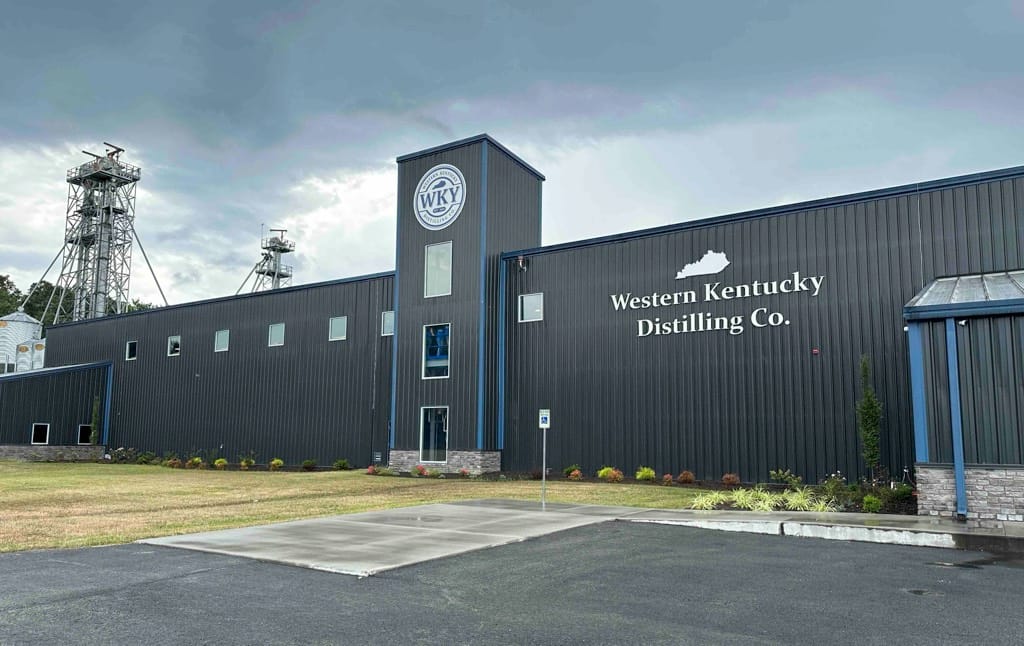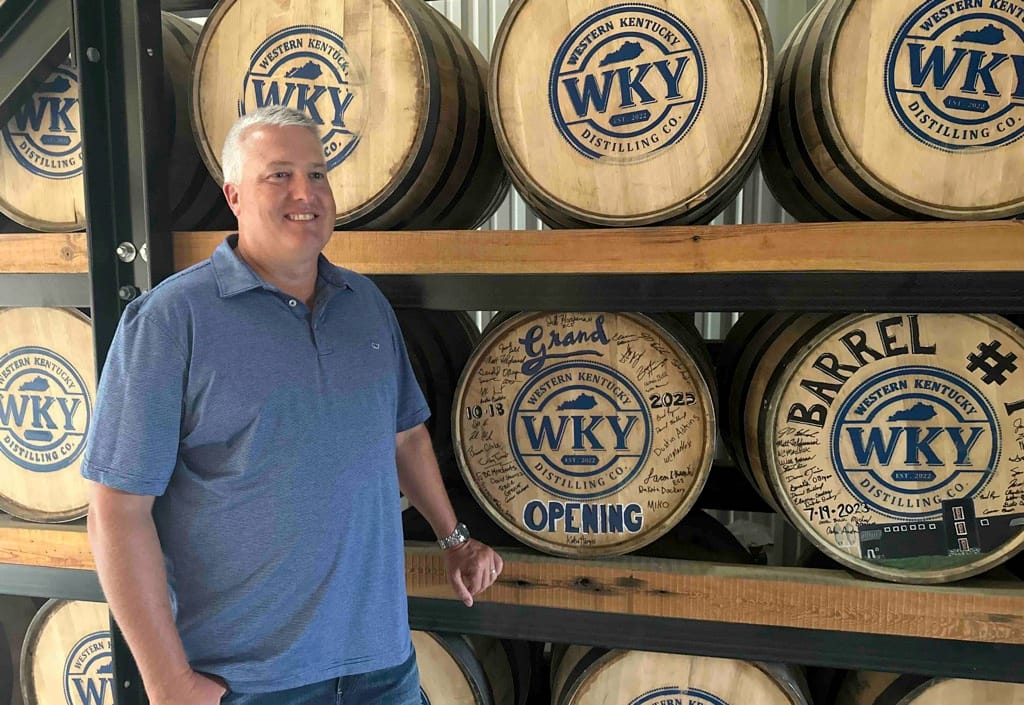
Contract Distilling is Fun, but Call Eyes Future for Family Brands at W. KY Distilling Co.

BEAVER DAM, Ky.— Few would be surprised that a Kentucky town bears a backwoods name like Beaver Dam, but whiskey lovers who appreciate large distilleries would be impressed by the size of Western Kentucky Distilling Co., located here. Set back a quarter mile from the Western Kentucky Parkway, which divides this city of 3,500 people, is its nearly 2-year-old 81-acre campus.
Construction on the green build site began in late 2022, and by July of 2023, distilling was underway. Using its 40-foot-tall, 36-inch-wide Vendome column still, barrels were being filled quickly and ready for stacking in the first of what now are three palletized warehouses onsite. Each 20,000-square-foot building holds 16,000 barrels, and there’s room for 12 more just like them. In total, they’ll have space for 250,000 barrels.
Making more great whiskey is still No. 1.
Though a visitor and events center is in the works, it’s not at the top of the to-do list, said Jacob Call, cofounder, master distiller and chief operating officer.
“We do want visitors to come here eventually, but there are other priorities in mind,” he said. Making more great whiskey is still No. 1. “But I'll be glad soon as we get done with construction—finish the asphalt and no more tracking in the mud.”

A distillery veteran, Call has earned the right to do a completely new build. After several years in banking, Call joined his father to operate Florida Distillers, a long-running custom blender and bottler for many spirits brands. A veteran distiller from James. B. Beam Distilling Co., Ron Call taught his son the business, which later opened the door to an opportunity back in his home state of Kentucky.
“The Old Medley Distillery in Owensboro had been shut down for 25 years, and no one seemed interested in running it,” Jacob Call said. “We took a look around … knew it needed a lot of work, but we saw an opportunity to do something with it in 2014.”
Distilling started under the O.Z. Tyler name before the brand was switched to Green River Distilling Co., founded in 1885 as “The Whiskey Without Regrets.” Call loved the brand’s history, but the distillery was old and in need of patching up. Despite its age, he and his team managed to crank out 100,000 barrels a year using its impressive 54-inch-wide column still.
When the Green River bourbon line rolled out in February of 2022, critics and customers loved it. A rye soon followed and a wheated bourbon was added a year later. By then, though, Call was on to WKDC, where he and cofounder and president, J.D. Edwards (then Green River’s immediate-past controller) were busy setting up the distillery.
“As far as Green River, we really had no money to upgrade it,” Call said. “It was a lot of asking, ‘How do we take this old still and do what we need to?’
“With this place, we wanted to make the whole thing linear from grain receiving, to the cookers, to the fermenters, to the still and to barrel filling. Everything moves so easily in here.”
The thoroughly modern distillery can be run by three operators 24-7. Automation is in place wherever possible, but while “that doesn’t make it foolproof, it does alert us to problems faster than we’d learn about otherwise,” Call added.
When I arrived in early July, the distillery was amid its annual shutdown and crews were preparing for the tedious work of descaling the insides of the still. The column’s exterior got a tidy polishing, but a starter-stalactite was dangling from a tray near the still’s center.
“Yep, that’s what it looks like when it’s been run wide open for a year,” Call said.
Ultimately, we want to be known for making great, traditional bourbon and rye whiskeys...
Customers’ whiskey first
As he did at Green River, the bulk of the whiskey produced at WKDC so far is for contract customers, many of them craft distilleries. A partnership with Brindiamo Group created a virtual sales force for WKDC since that company finds investors and distilleries wanting barreled whiskies.
The lone WKDC brand on the market is Hemmingway Rye, which is made from a blend of rye stocks distilled at MGPI and Green River. WKDC has produced several thousand barrels of its own rye for Hemmingway, but their release is many years away.
“Ultimately, we want to be known for making great, traditional bourbon and rye whiskeys,” Call said. “We do a number 4 char on all our barrels, but that’s not to say we won’t do a toasted release down the road.”
Asked why he chose palettized warehousing versus ricking, Call said bluntly, “The cost of ricking is outrageously expensive. Also, to get going at the speed that we have, there's no way I could have built traditional rickhouses fast enough. I liked having that fast start.
“I also built these houses a little differently from other palletized warehouses. We have exhaust fans and other than the roofs, they're not insulated. They heat up and cool down super quick, and I've got spacing between barrels where we can do that. Air circulation is good inside, and I can tell in the whiskey we’ve made so far that we’re doing just fine.”
True to his word, samples he shared of 1-year and 18-month bourbons were unlike any I’ve had of that age: amazingly mature so soon.
Making whiskies for others in his own place is fun, but to have our family’s name on our own unique brands—a flagship brand is what gets me up in the morning. It gets me excited.
Plans for future brands will draw heavily on the Call family name and its whiskey history. The oldest of his clan was Samuel Call, who came to Kentucky in 1791. During Covid shutdowns, Jacob Call a hired genealogist to research his family history and found that in the six generations previous to his father’s, there were distillers. Even Samuel Call was a large player for his time.
The genealogist found estate records showing Samuel Call had “a 75-gallon still, a 120-gallon still and 12 fermenters. So he was not a hobby distiller,” Call said. “Samuel Call will be a single barrel bourbon, and it’ll have his original signature that I found on his documents.”
Making whiskies for others in his own place is fun, he said, “but to have our family’s name on our own unique brands—a flagship brand is what gets me up in the morning. It gets me excited.”